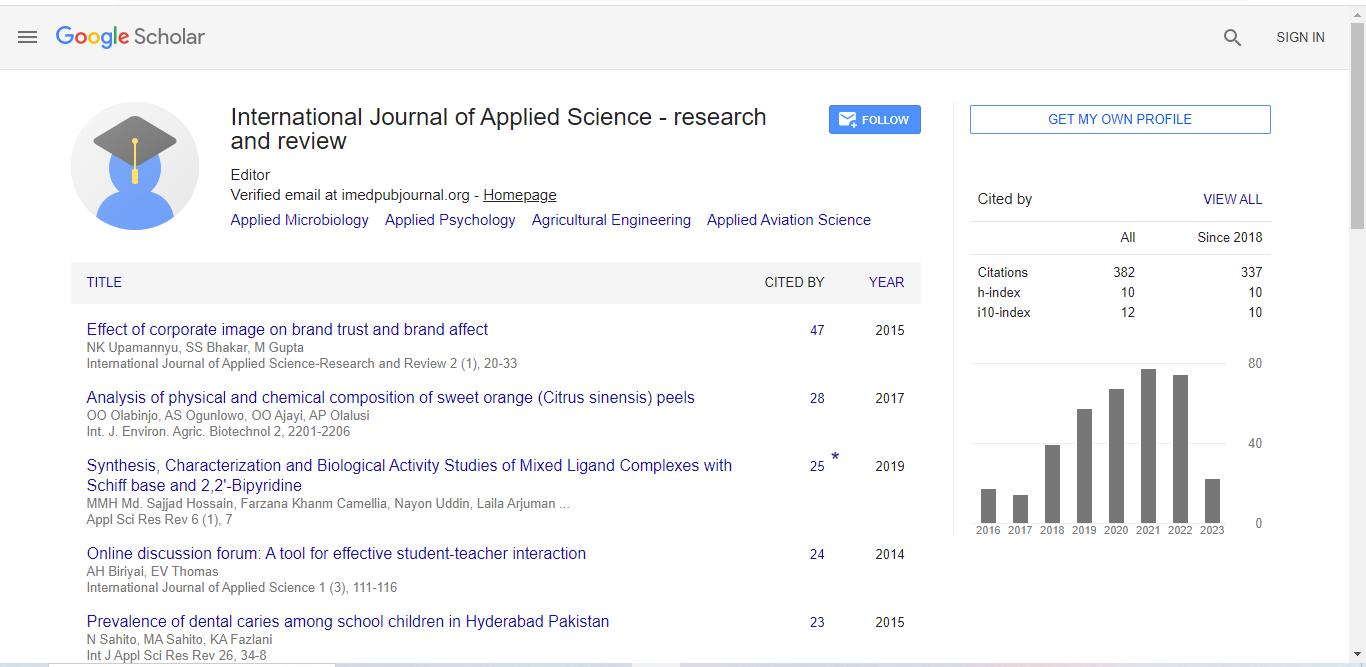Opinion Article - (2024) Volume 11, Issue 2
Navigating Complexity: A Holistic Approach to Resilience and Time Management in Healthcare Academia
Mia Isabella*
Department of Applied Science, Summit University, Switzerland
*Correspondence:
Mia Isabella,
Department of Applied Science, Summit University,
Switzerland,
Email:
Received: 01-Apr-2024, Manuscript No. IPIAS-24-19810;
Editor assigned: 03-Apr-2024, Pre QC No. IPIAS-24-19810 (PQ);
Reviewed: 17-May-2024, QC No. IPIAS-24-19810;
Revised: 22-Apr-2024, Manuscript No. IPIAS-24-19810 (R);
Published:
29-Apr-2024, DOI: 10.36648/2394-9988-11.15
Introduction
A Holistic Approach to Resilience and Time Management in
Healthcare Academia emphasizes the integration of resilience
and effective time management to thrive in the demanding field
of healthcare education. This approach advocates for the cultivation
of mental and emotional strength, allowing professionals
to better handle stress and adapt to changing circumstances. It
also highlights the importance of strategic time management
practices to balance clinical, academic, and personal responsibilities.
By adopting a holistic perspective, healthcare academics can
enhance their productivity, maintain well-being, and ultimately
deliver superior education and patient care amidst the complexities
of the modern healthcare environment. At the core of this
systemic model is the concept of resilience, which encompasses
the ability to adapt, cope, and thrive in the face of adversity and
stress. Healthcare academics often encounter a myriad of stressors,
including heavy workloads, time constraints, organizational
pressures, and emotional demands. Building resilience involves
developing coping mechanisms, fostering social support networks,
cultivating self-awareness, and maintaining a positive mindset in
order to effectively manage stress and maintain well-being. Time
management is another critical component of success in healthcare
academia, as professionals must juggle multiple responsibilities
while ensuring that deadlines are met and priorities are addressed.
Effective time management involves setting clear goals,
prioritizing tasks, managing distractions, and utilizing time-saving
strategies to maximize productivity and efficiency. By allocating
time and resources effectively, healthcare academics can optimize
their performance and achieve a healthy work-life balance. The
systemic model for resilience and time management in healthcare
academia integrates these concepts into a holistic framework that
addresses the interconnectedness of individual, organizational,
and environmental factors.
Description
By cultivating self-awareness and self-care practices, individuals
can enhance their ability to manage time effectively and maintain
resilience in the face of challenges. Organizational support
plays a crucial role in fostering resilience and facilitating effective
time management among healthcare academics. Institutions can
provide resources and initiatives such as employee assistance
programs, wellness workshops, flexible work arrangements, and
mentorship programs to support the well-being and professional
development of their faculty and staff. By promoting a culture
of support, collaboration, and work-life balance, organizations
can create an environment that enables healthcare academics to
thrive and excel in their roles. Furthermore, the systemic model
recognizes the importance of environmental factors, such as
workload demands, institutional policies, and external pressures,
in shaping the experiences of healthcare academics. By advocating
for systemic changes, such as workload redistribution, streamlined
administrative processes, and recognition of non-clinical contributions,
stakeholders can create conditions that facilitate resilience
and effective time management within the healthcare academic
community. Additionally, collaboration and communication among
interdisciplinary teams can enhance coordination and efficiency,
leading to better outcomes for both individuals and organizations.
Conclusion
The systemic model for resilience and time management in healthcare
academia offers a comprehensive approach to navigating the
challenges of this demanding field. By integrating resilience-building
strategies with effective time management techniques, healthcare
academics can enhance their ability to cope with stress,
maintain well-being, and achieve their professional goals. Through
individual, organizational, and systemic efforts, stakeholders can
create a supportive environment that fosters resilience and enables
success in healthcare academia.
Citation: Isabella M (2024) Navigating Complexity: A Holistic Approach to Resilience and Time Management in Healthcare Academia. Int J Appl Sci Res Rev. 11:15.
Copyright: © 2024 Isabella M. This is an open-access article distributed under the terms of the Creative Commons Attribution License, which permits unrestricted use, distribution, and reproduction in any medium, provided the original author and source are credited.

